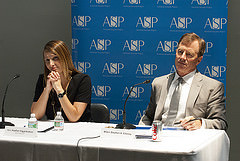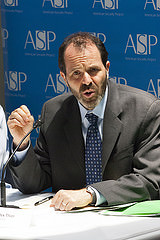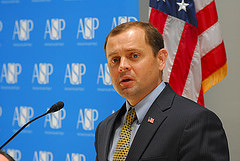On June 24th, the American Security Project hosted an opportunity for Congressional engagement on the upcoming Quadrennial Diplomacy and Development Review with Deputy Secretary of State Heather Higginbottom, Special Representative Tom Perriello, and Assistant to the Administrator of USAID Alex Thier.
The event was introduced and moderated by American Security Project CEO Brigadier General Steven Cheney. Nelson Cunningham, President of McClarty & Associates, introduced Deputy Secretary Higginbottom.A video of the speakers and photographs from the event can be seen at the end of this post.
Deputy Secretary Higginbottom spoke about the goals of the QDDR and the State department’s sincere desire to engage with Congress, NGOs, thought-leaders, and other stakeholders to answer the key questions of the Review- 1) how can State and USAID modernize and become more efficient and agile 2) what diplomatic and developmental successes can be built upon and 3) what are the global trends and how can the Department best address them in the next two decades?
The Deputy Secretary’s remarks also underscored the vital role of smart power in the future of American foreign policy, the need to stay ahead of global trends, the undeniable impact of climate change and the need to recalibrate diplomacy and development in an era of diffuse rather than hierarchical power structures. She noted that the QDDR is largely about prioritizing. “The QDDR cannot be everything to everyone, and it is not going to try to be. But it will be relevant to the work that we do and the work that we do going forward. We want to focused the QDDR on a few big challenges and a few big opportunities- the issues that are most central to building a successful platform for foreign policy in the decades ahead.” Only recommendations that fit into the strategic framework of the Review will be published, though appropriate recommendations outside the scope will also be implemented.
Alex Thier of USAID’s Policy, Planning, and Learning (PPL) Bureau articulated that the Review does not consider diplomacy and development separately but rather diplomacy and development as two necessarily interconnected aspects of foreign policy and affairs- a view cemented in the Presidential decision directive on development. “The world in which America will thrive in the next two decades is one where America can enjoy, take advantage of, and promote some of the most important global trends in human development.”
Thier notes that the success of the Millennium Development Goals to alleviate 50% of extreme poverty four years ahead of schedule means over 700 million people are now engaged in the market, and the information age and are able to hold their governments accountable in a way those unable to meet their most basic needs cannot.
According to Thier, this newly engaged global citizenry supports American values and national interests and successful development projects increase the size of this population everyday. “Our ability to take advantage of and accelerate those trends is fundamentally in the core American interest.” As the upcoming QDDR comes less than a year before the selection of the next Millennium Development Goals, it provides a unique opportunity for America to participate in that process with a clear strategic vision and a more comprehensive understanding of its strengths, successes, and areas for growth.
Former Congressman Tom Perriello, Special Representative to the QDDR who has met with more than 25 embassies and over 100 stakeholder groups seeking input on the Review, followed Thier and reiterated the Deputy Secretary’s emphasis on partnership between USAID and State.
Perriello went on to point out that the decision to complete a second QDDR despite a change in State leadership is an important step, signifying a commitment to a legacy that is longer than four years. “How do we make sure our overall strategy…[does] not simply reflect the fact that we did things that way last year, but because we’ve made the deliberate strategic decision that this is how we best advance the interests of America.” He then encouraged those in attendance to reach out him personally with comments, recommendations, and solutions for the upcoming Review.
His email, and the general QDDR contact information, can be found at the end of this post.
The question and answer session opened with a brief outline of the QDDR timeline. Perriello and others will continue actively seeking input throughout the summer with the finalization process beginning in late summer, early spring. The Review will be released in time for the four-year anniversary of its predecessor in June.
Several questions addressed public support for foreign aid. Deputy Secretary Higginbottom and Mr. Thier both acknowledged the need to do a better job “telling the story,” though there is strong support for diplomacy efforts once its merits are openly discussed. Deputy Secretary further emphasized the importance of a public education campaign focusing in part on the military’s support for a “phase zero” using diplomacy and development to prevent armed conflict. A subsequent question raised what some see as feelings of entitlement to US foreign aid by countries who have received support since USAID’s founding 60 years ago. Mr. Thier answered by highlighting the importance of good governance in decreasing dependency on foreign aid, and the challenges raised when funding for poor performing countries, particularly funds dedicated to institution building, are cut. He went on to say strong governance is vital for successful governance and more often than not, poor performing countries are also those with poor governance. Reiterating the sentiments of President Obama’s West Point commencement address, Their highlighted the importance of smart power in building accountability and local institutions that then allows states to move away from dependence on foreign aid.
Many of the audience questions provided the panelists with opportunities to further clarify State and USAID’s approach to the QDDR and encourage input on potential items metrics for mission success, capacity building and more robust partnerships with NGOs like Heifer International and private sector organizations.
To contribute recommendations, Perriello can be reached directly at perriellot@state.gov. The general email contact for the QDDR is QDDRideas@state.gov
For more on the QDDR:
The post QDDR – the future of State and USAID with DepSec Higginbottom appeared first on American Security Project.





